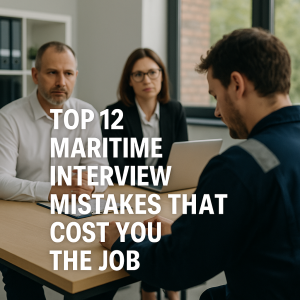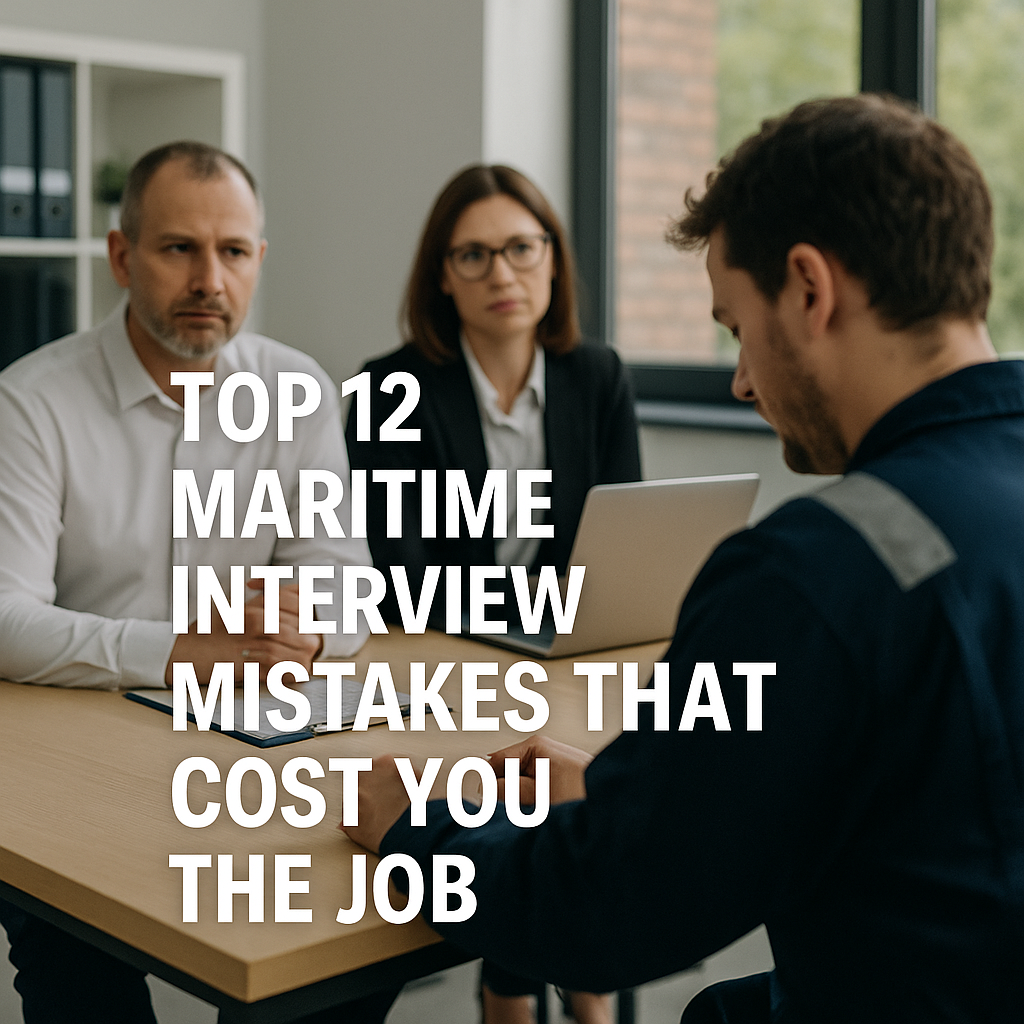 Discover the top 12 maritime interview mistakes that can cost you your dream job. Learn how to avoid them with real examples, expert insights, and proven strategies to stand out in your next seafaring or shore-based interview. If you’re aspiring to land a position in the maritime industry—whether onboard a vessel or in a shore-based office—interviews are the decisive moment that define your career journey. Many qualified candidates lose opportunities not because of lack of skill, but because of small, avoidable mistakes during interviews.
Discover the top 12 maritime interview mistakes that can cost you your dream job. Learn how to avoid them with real examples, expert insights, and proven strategies to stand out in your next seafaring or shore-based interview. If you’re aspiring to land a position in the maritime industry—whether onboard a vessel or in a shore-based office—interviews are the decisive moment that define your career journey. Many qualified candidates lose opportunities not because of lack of skill, but because of small, avoidable mistakes during interviews.
This comprehensive guide explores the top 12 maritime interview mistakes that cost professionals their dream roles. Each section provides real-life context, practical corrections, and professional advice to help seafarers, cadets, superintendents, and maritime students stand out confidently.
Why This Topic Matters
In today’s maritime job market, success is about more than just having the right STCW certification, sea-time, or simulator hours. Employers are searching for well-rounded professionals—people who can combine technical expertise with adaptability, teamwork, and a genuine understanding of modern shipping challenges like decarbonization, digitalization, and safety culture.
A single poor interview can undermine years of effort. It affects not just the current opportunity, but also your professional reputation in a small, tightly connected global industry. Knowing what not to do can be as important as knowing what to do.
–
The 12 Mistakes That Cost You the Job
Below are the most frequent and damaging mistakes candidates make—along with how to fix them effectively.
1. Under-preparing on the Company, Vessel, or Fleet
Many applicants assume the interviewer won’t test them on company knowledge. But recruiters expect candidates to know about the organization’s fleet, operations, and mission. Failing to research makes you appear unmotivated.
Fix:
Before your interview, study the company’s website, vessel portfolio, and recent developments. Check Equasis, MarineTraffic, or news sites for updates. Prepare one or two thoughtful comments that show genuine interest. For example:
“I saw you recently retrofitted part of your fleet for LNG fuel—my experience in dual-fuel operations could contribute directly to those initiatives.”
2. Arriving Late, Poorly Dressed, or Disorganized
Punctuality is a hallmark of maritime professionalism. Arriving late or appearing unkempt immediately damages your credibility.
Fix:
Confirm the time, test your route (or connection for virtual interviews), and arrive at least 15 minutes early. Dress in clean, professional attire. Even for video calls, ensure proper lighting, background, and posture. Bring or have ready all necessary documents neatly arranged.
3. Failing to Connect Your Experience to the Role
Some candidates simply list their past duties without explaining how those experiences apply to the current job. Interviewers need to see the bridge between your past performance and their current needs.
Fix:
Study the job description and align your experience point-by-point. Use the STAR method—Situation, Task, Action, Result—to tell relevant stories. For example:
“While serving as Third Engineer, I optimized the fuel transfer schedule, saving over 10% consumption per voyage. I’d apply the same efficiency mindset to your vessel operations.”
4. Overstating or Misrepresenting Certifications or Sea-Time
Exaggerating sea-time, rank, or qualifications is a serious error in a regulated industry. Most employers verify documents through flag states, classification societies, or Equasis databases.
Fix:
Always state your credentials honestly. If you have gaps or incomplete sea-time, acknowledge them and focus on what you learned during the interim. Integrity builds long-term trust.
5. Focusing Only on Technical Knowledge and Neglecting Soft Skills
Seafarers often rely solely on technical answers—navigation, machinery, safety equipment—but employers now prioritize teamwork, communication, and adaptability. The ability to lead multicultural crews and resolve conflicts calmly is equally important.
Fix:
Prepare short stories that highlight leadership, collaboration, and conflict resolution. Mention moments when you supported crew morale, handled emergencies, or guided new cadets. Show empathy and teamwork, not just technical accuracy.
6. Giving Vague or Generic Answers
Saying “I’m a hard worker” or “I handle stress well” without evidence adds no value. Recruiters seek tangible, verifiable examples of your competence.
Fix:
Provide specific stories:
“During a sudden generator failure, I coordinated with the engine team to restore power in 12 minutes, preventing cargo temperature deviation.”
Use real outcomes—time saved, risks prevented, costs reduced.
7. Not Asking Intelligent Questions
When the interviewer asks, “Do you have any questions for us?” many candidates freeze or ask about salary first. That signals lack of curiosity.
Fix:
Prepare thoughtful questions such as:
- “What are the company’s biggest safety challenges right now?”
- “How does your fleet prepare for new IMO decarbonization regulations?”
- “What kind of onboard mentorship programs do you offer cadets?”
Such inquiries show initiative and a long-term mindset.
8. Speaking Negatively About Past Employers or Crews
Badmouthing a former company or captain immediately raises concerns about professionalism and discretion.
Fix:
Even if you had a difficult experience, frame it constructively:
“Working under tight time pressure taught me the importance of clear communication and planning.”
Always focus on lessons learned, not grievances.
9. Discussing Salary and Benefits Too Early
Bringing up pay in the opening minutes can make you appear money-driven rather than mission-driven.
Fix:
Wait until later in the interview, once mutual interest is clear. If the topic arises early, respond gracefully:
“I’d be happy to discuss compensation after we’ve confirmed the role’s fit and responsibilities.”
Research typical salary bands beforehand to show awareness.
10. Struggling with Behavioural or Situational Questions
Modern maritime interviews often include situational scenarios: “What would you do if the chief engineer disagreed with the captain?” or “How would you respond to a machinery failure at night?”
Fix:
Practice behavioural questions using STAR:
- Describe a real scenario you faced.
- Explain the task or challenge.
- Detail your actions.
- State the result.
Focus on leadership, communication, and safety compliance.
11. Showing Little Awareness of Industry Trends and Regulations
Candidates who cannot discuss new IMO measures, digital tools, or decarbonization projects appear outdated. Maritime companies want professionals who can evolve with the industry.
Fix:
Stay informed about:
- IMO’s GHG reduction strategy, EEDI/EEXI, and CII.
- EU Fit for 55 policies and emission trading systems.
- Technological innovations like autonomous navigation, electronic logbooks, or predictive maintenance.
Reading reports from DNV, Lloyd’s Register, and UNCTAD keeps you current and credible.
12. Ending Weakly or Failing to Follow Up
Many candidates leave the room (or log off) abruptly, missing the opportunity to summarize their strengths. Some never send a thank-you message.
Fix:
End confidently:
“In summary, my experience in [X] and commitment to safety culture make me confident I can add value to your team.”
Then, within 24 hours, send a brief thank-you email reiterating interest and professionalism. This small gesture leaves a strong final impression.
–
Real-World Illustrations
Chief Engineer’s Exaggeration
A candidate claimed 20 years of LNG experience but failed to provide supporting certificates. Once the company verified records, the discrepancy ended the process.
Lesson: Always ensure your documentation aligns with your claims.
Superintendent’s Missed Closing
A highly technical candidate completed his interview but exited without summarizing or thanking the panel. His competitor closed strongly and secured the offer.
Lesson: The final words often shape the final impression.
Cadet’s Redemption via Follow-Up
Two equally qualified cadets competed for a deck position. One sent a courteous follow-up email thanking the recruiter and referencing their shared discussion about navigation technology. That small act distinguished him from others.
Lesson: Thoughtful follow-ups show engagement and maturity.
Frequently Asked Questions (FAQ)
1. What makes maritime interviews unique?
They often test crisis response, safety awareness, chain-of-command discipline, and international teamwork—skills critical at sea.
2. How should I explain a career gap?
Be transparent and concise. Focus on skills developed during the break, such as additional training or certifications.
3. What are tips for virtual maritime interviews?
Test your equipment, ensure a quiet background, maintain eye contact with the camera, and dress fully professional.
4. How can a student or cadet answer behavioural questions with limited experience?
Use examples from school projects, simulator sessions, or internships that demonstrate teamwork and initiative.
5. When is it appropriate to ask about salary?
Near the end of the interview or after the employer shows intent to proceed. Timing and tone matter.
6. What should I read to prepare for current maritime trends?
Industry reports from IMO, DNV, Lloyd’s List, UNCTAD, and journals such as Maritime Policy & Management or Marine Engineering Review are excellent sources.
Summary of the 12 Key Mistakes
| # | Mistake | Why It’s Costly | How to Fix It |
|---|---|---|---|
| 1 | Not researching the company | Shows lack of interest | Study fleet, services, and latest news |
| 2 | Poor punctuality or attire | Reflects unreliability | Arrive early, dress smart |
| 3 | Generic experience | Seems irrelevant | Link to job description |
| 4 | Exaggerating credentials | Breaks trust | Always stay factual |
| 5 | Ignoring soft skills | Misses leadership test | Share real teamwork stories |
| 6 | Vague answers | Forgettable | Use concrete STAR examples |
| 7 | No intelligent questions | Lacks curiosity | Prepare thoughtful queries |
| 8 | Negative about past employers | Shows poor attitude | Stay diplomatic |
| 9 | Salary talk too soon | Misaligned priorities | Wait until later |
| 10 | Weak behavioural answers | Suggests inexperience | Practice STAR storytelling |
| 11 | Unaware of trends | Appears outdated | Follow maritime developments |
| 12 | Weak closing / no follow-up | Leaves no impression | End strong and send a thank-you |
Conclusion
Maritime interviews demand more than technical proficiency—they test integrity, curiosity, discipline, and cultural fit. Avoiding these 12 common mistakes transforms your interview from a mere formality into a powerful showcase of who you are as a professional.
The global maritime industry is entering a new era defined by sustainability, digitalization, and resilience. Employers seek adaptable individuals who embody lifelong learning and leadership. Every interview is a chance to demonstrate that you belong to this future generation of seafarers and maritime professionals.
Before your next interview, review this list, prepare your stories, polish your delivery, and walk in with confidence—you’ll not just pass the interview, you’ll sail through it.
References
-
International Maritime Organization (IMO). STCW Convention and Code; MARPOL; IMO GHG Strategy Reports.
-
Lloyd’s Register. Maritime Decarbonisation and Human Element Reports (2023–2025).
-
BIMCO. Seafarer Workforce Report (2021).
-
UNCTAD. Review of Maritime Transport (2023).
-
DNV. Maritime Forecast to 2050.
-
The Nautical Institute. Maritime Interview Preparation Guidelines.
-
Marine Society. Interview Techniques for Seafarers.
-
Martide. Common Mistakes Seafarers Make During Job Interviews.
-
The Maritime Executive. Recruitment and Retention Insights in the Shipping Industry (2024).
-
Lloyd’s List Intelligence. Global Maritime Employment Trends.
-
World Maritime University (WMU). Career Preparation for Maritime Professionals.
-
International Chamber of Shipping (ICS). Global Supply and Demand of Seafarers.
-
The Conversation & National Geographic. Human Factors and Leadership at Sea Studies.
-
Marine Insight. Seafarer Interview Preparation Tips.
-
Paris MoU. Port State Control Annual Report (2023).

